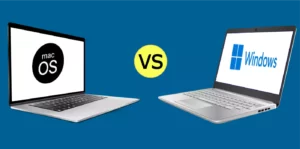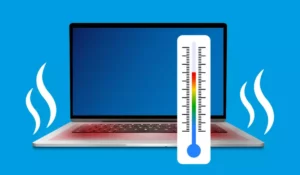The speed of the computer is one of the most important aspects to enjoy its operation. However, there are circumstances in which the computer becomes slow and does not provide good performance. In this regard, you might be wondering if Macs slow down like Windows PCs.
MacOS is a more stable system than Windows, so they slow down less often. However, the slowdown of the computer depends not only on the OS but also on the hardware and its current lifespan. Likewise, the programs that you have installed and the optimization of the platform come into play.
Still, a Windows computer can be just as fast as a Mac, while a Mac can get slow. We explain all the factors involved below.
Mac vs Windows: which is faster?
Between Windows and Mac, there has always been an eternal rivalry, where the performance section is one of the most prominent. In general terms, there is no better equipment than another, but each one is intended for a different type of use.
On the other hand, there is no platform faster than the other, although it is no secret that Windows is more susceptible to slowing down. This is because it is slightly more vulnerable to cyber attacks, and in some circumstances, updates are not being done as they should.
Still, Windows is a fairly stable and fast operating system when properly optimized. In the same way, macOS is robust, solid, and offers a great performance to the user, but if maintenance is not done frequently or if the wrong functions are activated, it could slow down.
Top 5 reasons why Mac is generally more stable than many Windows PC in terms of average performance speed
Despite not being absolutely resistible from slowdowns, on average, Mac computers, particularly the macOS are often more stable than Windows. Although this is not to say that Windows is de jure a less stable operating system, there are actually more low-performing Windows PCs that exist in the market to accommodate budget buyers than Mac.
There is no low-performing Mac computer sold in the market. These factors contribute to why in general, Mac is more stable than Windows. Listed below are the top 5 reasons why a Mac is still generally more stable than Windows.
1. Apple solely controls both the Mac hardware and the macOS
We all know that Apple does not share macOS with other computer manufacturers. This means that Apple makes their own hardware for their Mac computers. Having the sole discretion to the hardware design and without the pressure demands of other computer manufacturers, Apple makes sure that all Mac hardware is almost 100% optimized with macOS.
They can do it better since both hardware and OS assemblers work internally within Apple’s organization and jurisdiction, and because of this, Apple does prototype testing better than Windows before the product release.
The higher the optimization between the hardware and operating system, the better and faster the performance. On the contrary, Windows OS is designed to be used not only for Microsoft-made computers but also for other computers manufactured by non-Microsoft manufacturers.
2. The hardware drivers are well installed and functioning
Related to no. 1 of this section, since Apple solely controls the hardware and software design of their computers, they make sure that during testing, the hardware drivers are well installed too before product releases. This makes Mac computers not only more stable to use but also more reliable and hassle-free.
However, on Windows, it is not necessarily Microsoft’s fault for faulty drivers. Most of the time, it is the computer manufacturer which tests Windows on their own products. Due to the prevalence of many computers manufacturers dependent on Windows OS, some hardware drivers are not tested well before release.
3. Apple only manufactures mid-range laptops which can also be considered high-range by common users
Have you heard of a low-range budget Apple Mac? Maybe, a very old and outdated one that is sold second-hand. But all their new Mac releases are only limited to at least at a mid-range scale for advanced users, which is already a high-range device in terms of common user standards.
Most of the time, an entry-level Mac costs at least a thousand dollars. With a computer design at this range and sold at a higher price, it is a no-brainer to expect a Mac computer to be more stable than many Windows PCs at lower ranges.
4. They have built-in apps and shortcut controls that are well-optimized with the macOS
Related to no. 1 and no. 2 of this section, Apple has better testing capabilities since they control both the hardware, the operating system, and the software itself. This means Apple can design whatever apps and control system they want to implement on their Mac computers, and this is done internally within Apple’s organization and jurisdiction.
5. Mac and the macOS are almost not modifiable after sale
Mac computers can be upgraded for higher hardware specs or to have additional software, however, most of the time, this can only be done upon pre-purchase. After purchasing a Mac, there’s a very slim chance it can be modified by Apple.
This means that Mac computers were designed in a way that they will only stick to be used according to the design and standards applied by Apple during the presale. This restriction avoids stressing the Mac or misaligning the original design by third-party and unregulated add-ons.
Top 5 most common slow down issues on Windows that are not as prevalent on Mac
Some say slowdown issues on Windows are only more noticeable due to the majority of computer users globally using Windows. While this is true, there are also common slow-down issues that usually happen only on Windows and are less prevalent on Mac such as the top 5 causes we list below.
1. Windows registry
The registry may be thought of as a vast set of instructions for your computer, especially on Windows. The problem with Windows Registry is that it can be full of old keys from programs that are not installed any longer. Once the registry is clogged with hundreds of useless keys, a Windows PC slows down. This can also cause an inconvenience to the users as they are often difficult to find and remove.
A registry is not a thing on Macs. Instead, the app folder itself stores the settings and saves a certain app or program. Each software gets its own space on Mac’s storage. This also makes it simpler for Mac users to delete a program’s data with ease.
2. More vulnerable to malicious software
Despite both operating systems being closed-source, Windows is often a common target for malicious software. Windows users encounter far more viruses, malware, adware, spyware, and other forms of malicious programs when visiting websites.
This is however not entirely the fault of Microsoft as, during these recent years, they have been really working hard to eliminate such malicious attacks. It’s just that Windows is more popularly used by various users from different walks of life.
3. Windows updates
Although it is good that a Windows OS version updates more frequently, these update requests often cause disturbance to its users. Sometimes, Windows also produce unnecessary updates by installing features that are not very helpful, are automatically set on startup, and most of the time consume RAM.
This is not to say that Mac does not produce unnecessary updates, but often they are minor features that are almost unnoticeable. Apple usually only produce intra-OS updates to fix bugs of a certain version and other that are only important.
Whenever they want to release a major feature update, they do it with the next OS version. These make Mac computers better established before any major OS updates.
4. Windows randomly stores data in a handful of different locations upon installation
Related to no. 1, the Windows registry makes it often complicated to store data since it can randomly store them depending on the third-party program installed. Most of the time, the program data for operations are stored in Program Files.
However, the data for program settings and saves are often stored in a hidden folder, AppData, which is not often familiarized by common users. Some of the data saved are stored in the Documents folder, or any folder defaulted by Windows for that app.
This system not only confuses users, but it can also slow down their Windows PCs, especially when that program is uninstalled. If the user is not proficient enough to figure this out, some of the data might remain somewhere else upon uninstallation, usually in hidden system folders.
5. Windows upgraded OS versions are more prone to be forcedly installed on less-performing PCs
Since Microsoft sells Windows OS as a standalone operating system that can be installed on any computer, some users may install it on just any computer. Although Microsoft ensures that a Windows OS version must only be installed with the right hardware requirements, this is often overlooked.
Many users make insignificant hardware modifications on their computers just to forcedly install a newer Windows OS to keep on-trend even though the original design of their computer does not support it. Added to this is the prevalence of pirated Windows OS that can just be installed on almost any computer without proper technical judgment conducted by the installer.
If a newer Windows is forcedly installed on a less-performing computer or any computer that originally does not support it, it will surely slow down the PC.
Boost Your Business
Want more clients and sales? Our web development services will optimize your website to convert more visitors into customers.
Get Started TodayTop 10 things that can slow down a Mac
Now, we will discuss some factors that slow down a computer, and in this case Mac. However, these elements could also affect Windows computers, if applicable.
1. Resource eaters
There are resource eaters, that is, applications or programs that run in the background. In many circumstances, they are not necessary at all and all they do is slow down your PC. The solution is to open the Activity Monitor and identify the software that consumes the computer’s resources.
2. Applications that open on startup
Some apps are configured to run automatically when the operating system starts. This makes the computer start up much slower, and it will probably take longer to be fully operational. To mitigate this, go to System Preferences and select the Users and Groups tab.
In the launch at startup section, choose the applications you want to prevent from running right when you turn on the computer.
3. Multiple apps open
The more programs you have open at the same time, the more resources your computer will consume. Depending on the model of the Mac, it may not have enough hardware power to run a large number of applications at the same time. If you are not using certain programs that are open, it is better to close them.
4. Small amount of RAM
RAM shortage is a problem that affects not only Windows computers, but Macs as well. It is true that they might consume a little less, but if there is not enough, it is unlikely that your computer will perform well.
If you use heavy programs or need to have many tabs open in your internet browser, it is important that you expand the RAM memory.
5. Outdated software
This is another fairly common problem that slows down a Mac and needs to be fixed as soon as possible. The updates fix bugs and make the system more stable and robust. If you have an outdated version, it may no longer be supported by Apple, which could lead to a slowdown.
Make sure to update your computer frequently, at least when it comes to Mac. If you have a Windows PC, it is preferable to wait until the update is stable or read the reviews of the new package to see how it works. Sometimes, updates are not optimized and can slow down your computer.
6. Faulty hard drive
The hard drive is a piece that technically speaking has no impact on the performance of the computer. However, when it is damaged, it could have an impact on the performance because it will not be able to find the data stored on it correctly.
If your Mac is somewhat old, it probably has an HDD, so check with a technician to see if there is a possibility of swapping out the hard drive for an SSD. Solid-state drives are much faster, both for starting and shutting down the operating system and for moving files from one location to another.
7. Heavy programs
Some people who are not tech-savvy blame the operating system for running a poorly performing program. For example, there are very demanding video games that do not run on a PC without a good processor or a dedicated graphics card.
The same happens with heavy programs, such as those dedicated to the design and processing of videos and images. The slowdown does not depend on whether it is Windows or macOS but on the hardware power of your computer.
8. Too many temporary files
Third-party software, app, or browser can store temporary files and caches. An example of a temporary file is a file from the internet, opened but not downloaded to be saved on a folder you are familiar with. Do you think it wasn’t downloaded because you just wanted to open it? It still was but was saved to a folder destination that most common users don’t know where to find.
However, even when these temporary files are no longer needed, they still might remain on your computer. This might cause your Mac to run slowly. It’s a good idea to remove these log file caches from time to time to free up disk space, preserve your privacy, and fix speed difficulties.
9. Malware attack
Macs are relatively safe, but viruses and other malware may infect them. Malicious websites, file-sharing programs, and unwary & phishing email attachments are all common sources. Malware can slow down Macs on purpose, although it’s more typically a secondary consequence of resources being stolen and hacked.
Limiting third-party programs that may be installed on your Mac is one technique to lessen the risk of malware infestation. If you really need various third-party programs, always know them first before installing.
10. Overheating
With Mac Pros having larger casings like a tower-style PC, overheating is less of an issue. iMacs, MacBook Pros, MacBook Airs, and Mac Minis, on the other hand, are all rather small on the inside. They employ lithium batteries, which, like other portable electrical gadgets, can overheat when in use.
Mac vs Windows: Which one slows down the most?
If both operating systems are used correctly, neither should slow down, because the slowness comes from misusing computer resources or installing unwanted software.
Nevertheless, it might happen a little more frequently in Windows, because it is a slightly more vulnerable system. But that does not mean that Mac is not susceptible to slowdowns, because there are factors that cause the computer to not perform well.
In any case, you should do maintenance often and optimize your system as best as possible for the best performance.
Boost Your Business
Want more clients and sales? Our web development services will optimize your website to convert more visitors into customers.
Get Started Today







